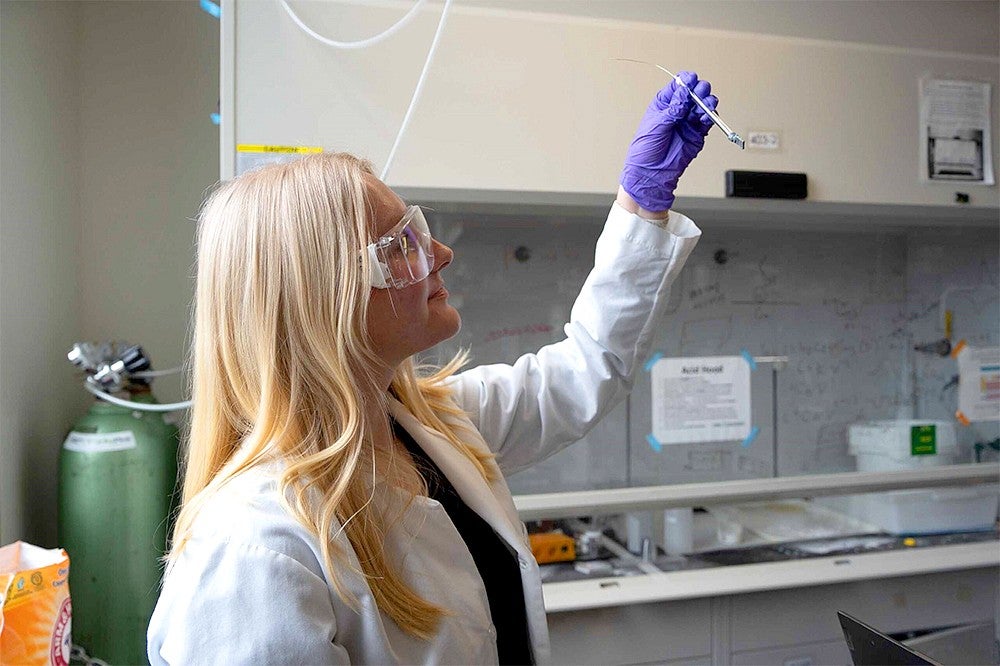
Experiential Learning | Research & Innovation | Community Impact | Career Preparation | Teaching Excellence | 21st Century Liberal Arts | Building Community | Good Vibes | CAS Spotlights | All Stories | Past Issues

Training the Next Generation of Green Chemists
BY NICOLE KRUEGER
APRIL 7, 2024
Caitlyn Cannan has investigated the mechanics of copper corrosion in solar devices, explored the effects of temperature on battery degradation and experimented with the use of Prussian blue, a pigment commonly used in inks and dyes, for energy storage.
The fourth-year student has attended conferences for the American Chemical Society and the Electrochemical Society and has presented her research to chemists from around the world. She has even collaborated with faculty researchers in Boston.
Cannan began conducting lab research during her first year as a chemistry major in the College of Arts and Sciences. Now on the cusp of graduating—and poised to wrap up her master’s degree in just one more year—she’s about to partner with Nel Hydrogen for a research project exploring uses for hydrogen energy.
“Coming into college, I knew I wanted to be a chemist, but I hadn’t thought about doing research,” she says. “Then I got put in a lab, and I ended up loving it. By spring term of freshman year, I knew I was going to be a scientist and researcher.”
In the Department of Chemistry and Biochemistry, where undergraduates regularly participate in faculty research on green materials and technology, experiential learning happens early and often—and ultimately helps students launch careers in which they’re empowered to help create a more sustainable future.
“The Chemistry department is one of our strongest departments when it comes to providing high-quality experiential learning opportunities for students,” says Elliot Berkman, divisional associate dean for the Natural Sciences. “The courses and research labs provide undergraduate engagement and provide the opportunity for undergrads to witness and participate in the creation of the next generation of green materials.”
By aligning their research with large-scale societal needs such as renewable energy and decarbonization—and by collaborating with industry partners in those areas—faculty within the department help both undergrads and graduate students build skills and gain experience that can lead directly to impactful jobs.
After investigating the absorptive potential of metal-organic frameworks (MOFs) in Assistant Professor Carl Brozek’s lab, PhD alumni Checkers Marshall and Kevin Fabrizio both got job offers from technology companies that use MOF nanocrystals for environmental sustainability. Described as “crystalline sponges,” these relatively new materials are attracting a lot of industry attention in a broad range of areas, from water harvesting to carbon capture, Brozek says.
“We’ve had multiple students who have gone on to work with companies in this area,” he adds.
Not only does undergraduate lab research help prepare chemistry and biochemistry students to land competitive jobs and internships in the field, but it often helps crystallize their career goals.
“In my experience, undergraduate research is everything,” says fourth-year chemistry major Nadia Barnard, whose research in Assistant Professor Paul Kempler’s lab helped her land an internship working on hydrogen fuel cell systems at the National Renewable Energy Laboratory in Colorado.
Barnard and Cannan are two of the first students to take advantage of the department’s accelerated master’s program, which allows undergrads to begin taking graduate courses during their senior year while also engaging in powerful embedded experiential learning opportunities with both faculty researchers and industry partners.
“In the end, it’s made me a better scientist,” Barnard says of the program. “I know how to design an electrochemistry experiment and what questions to ask. I feel much more well-educated.”
Not only has undergraduate research helped equip Cannan with the skills and experience needed to succeed in the field, but it has empowered her to take action in alignment with her values.
“I want to see the research I’m doing have some sort of impact on the clean energy industry,” she says. “I want to see what I’m doing impact other people.”
